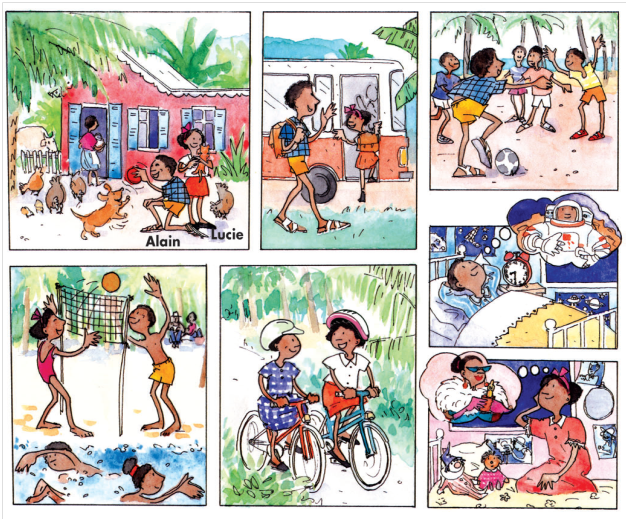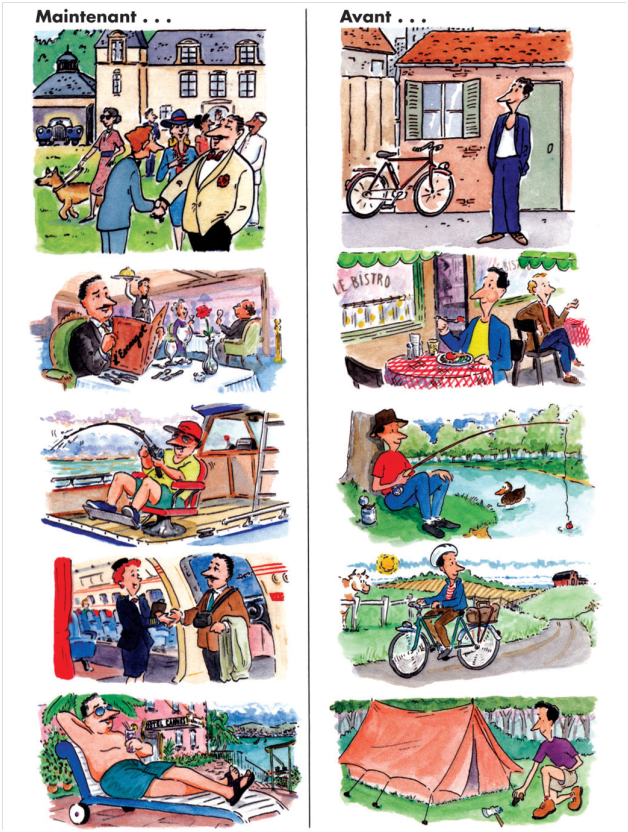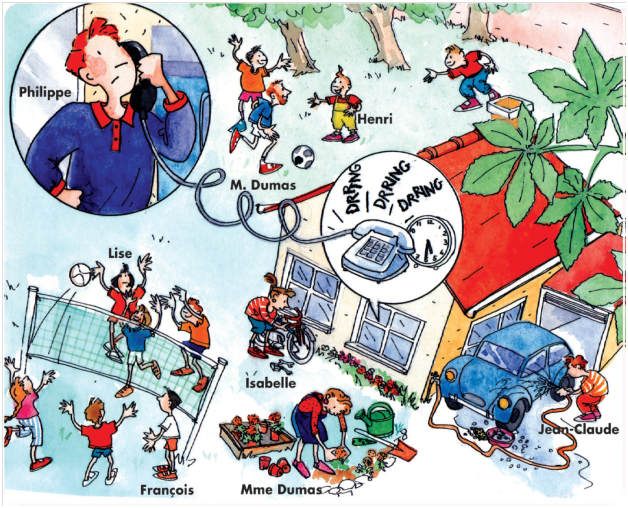Unité 6
Chez nous

Leçon 23:
À Menthon-Saint-Bernard
OBJECTIVES
Students will be able …
Communicative Functions and Topics
- To explain what you used to do in the past and when
- To describe where people were
- To describe ongoing past actions
- To read for pleasure and for information
Linguistic Goals
- To use the imperfect tense of regular verbs and être
- To contrast the imperfect and the passé composé
Cultural Goals
- To learn about French schools long ago
Vidéo
Warm up activities
1, 2 & 3, 4
A. L’imparfait: formation
In French, as in English, people use different tenses to talk about the past.
• The most common past tense is the PASSÉ COMPOSÉ, which you have been using.
• Another frequently used past tense is the IMPERFECT, or L’IMPARFAIT.
In the French sentences below, the verbs are in the IMPERFECT.
Où est-ce que tu habitais avant? Where did you live before?
J’habitais à Bordeaux. I lived (used to live) in Bordeaux.
Qu’est-ce que vous faisiez à six heures? What were you doing at six?
Nous finissions nos devoirs. We were finishing our homework.
The imperfect is a simple tense. It consists of one word. It is formed as follows:
IMPERFECT STEM + IMPERFECT ENDINGS
→ For all verbs (except être) the imperfect stem is derived as follows:
IMPERFECT STEM = nous_form of PRESENT minus -ons
→ The IMPERFECT ENDINGS are the same for all verbs.
| TYPE OF VERB |
-er
|
-ir |
-re |
IRREGULAR |
IMPERFECT
ENDINGS |
| INFINITIVE |
parler
|
finir |
vendre |
faire |
|
| PRESENT |
nous parlons |
finissons |
vendons |
faisons |
|
| IMPERFECT STEM |
parl-
|
finiss- |
vend- |
fais- |
|
IMPERFECT |
Je parlais
Tu parlais
il/elle/on parlait
nous parlions
vous parliez
ils/elles parlaient |
finissais
finissais
finissait
finissions
finissiez
finissaient |
vendais
vendais
vendait
vendions
vendiez
vendaient |
faisais
faisais
faisait
faisions
faisiez
faisaient |
-ais
-ais
-ait
-ions
-iez
-aient |
| NEGATIVE |
je ne parlais pas |
|
|
|
|
| INTERROGATIVE |
est-ce que tu parlais?
parlais-tu? |
|
|
|
|
→ Note how the above pattern applies to other verbs:
acheter: nous achetons → j’achetais
manger: nous mangeons → je mangeais
sortir: nous sortons → je sortais
dormir: nous dormons → je dormais |
lire: nous lisons → je lisais
écrire: nous écrivons → j’écrivais
prendre : nous prenons → je prenais
voir: nous voyons → je voyais
boire: nous buvons → je buvais |
→ Note the imperfect forms of the following expressions:
il y a → il y avait il neige → il neigeait il pleut → il pleuvait


B. L’imparfait du verbe être
The imperfect of être has an irregular stem ét-. The endings are regular.
j’ étais I was nous étions we were
tu étais you were vous étiez you were
il/elle/on était he/she/one was ils/elles étaient they were
→ The imperfect of être is used to tell where people were or how they were feeling.
It is NOT used to describe what they WERE DOING. Compare:
IMPERFECT of être IMPERFECT of verb of action
J’étais chez moi. I was at home. J’étudiais. I was studying.
Alice était malade. Alice was sick. Elle regardait la télé. She was watching TV.
C. L’usage de l’imparfait: événements habituels
In the sentences below, people are talking about the past. On the left, they describe what they used to do regularly. On the right, they describe what they did on a particular occasion.
Compare the verbs in each pair of sentences.
Habituellement (Usually) … Un jour …
Je regardais les matchs de foot. J’ai regardé un film.
Nous allions au cinéma. Nous sommes allés à un concert.
Paul sortait avec Nathalie. Il est sorti avec Nicole.
Although both the IMPERFECT and the PASSÉ COMPOSÉ are used to talk about the past,
each has a different function.
The IMPERFECT is used to describe habitual actions and conditions that existed in the past. It describes what people USED TO DO, what USED TO BE.
Quand j’étais jeune, When I was young,
nous habitions à la campagne. we lived (used to live) in the country.
J’allais souvent à la pêche. I often used to go (would go) fishing.
The PASSÉ COMPOSÉ is used to describe specific past events. It describes what people DID,
what TOOK PLACE, what HAPPENED.
Ma mère a acheté une voiture. My mother bought a car.
Hier, nous sommes allés en ville. Yesterday we went downtown.
VOCABULAIRE Quelques expressions de temps
Événements spécifiques Événements habituels
un soir one evening le soir in the evening
tous les soirs every evening
mardi Tuesday le mardi on Tuesdays
un mardi oneTuesday tous les mardis every Tuesday
un jour one day chaque jour every day
le 4 mai on May 4 tous les jours every day
une fois once d’habitude usually
deux fois twice habituellement usually
plusieurs fois several times autrefois in the past
parfois sometimes
Mots croisés
38, pg. 343
D. L’usage de l’imparfait: actions progressives
Compare the uses of the IMPERFECT and the PASSÉ COMPOSÉ in the following sentences.
À sept heures, je regardais un film. At seven, I was watching a movie.
Après le film, je suis sorti. After the movie, I went out.
Nous attendions Marc au café. We were waiting for Marc at the café.
Finalement, il est arrivé. Finally, he arrived.
The IMPERFECT is used to describe actions that were in progress at a certain point in time. It describes what WAS GOING ON, what people WERE DOING.
À sept heures, je faisais mes devoirs. At seven, I was doing my homework.
→ The imperfect is used to express the English construction was/were + … ing.
The PASSÉ COMPOSÉ is used to describe specific actions that occurred at a specific time.
It describes what TOOK PLACE, what people DID.
À sept heures, quelqu’un a téléphoné. At seven, someone phoned.

Quizlet
Quizlet Live
Vidéo Activités
Vidéo
Vidéo Activités Worksheet
Script
Audio Activités
Audio Activités Worksheet
Script
Les devoirs
|
|
Activités pour tous - Answers |
Workbook Activities - Answers |
Quiz 23
Quiz 23 Script
Leçon 24
Unité 1 - TEST (A)
Audio Script
Unité 2
|




